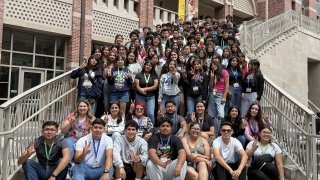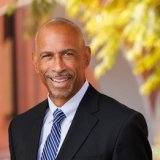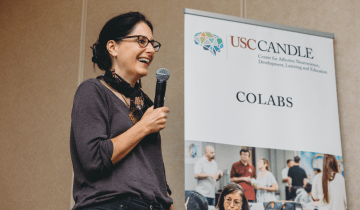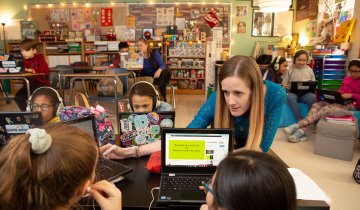Over 70 high school students from the Teaching Outstanding Math to Migrant Youth (TOMMY) program walked past USC’s iconic Tommy Trojan statue—many setting foot on a college campus for the first time. With cautious hope and shared stories rooted in hard work and resilience, these students—all children of migrant farmworkers from California’s Central Valley and San Diego area—formed the inaugural TOMMY cohort, a summer program designed not only to build confidence in mathematics but to spark possibilities for the future.
More than just a math camp, TOMMY is a collaborative effort led by the USC Race and Equity Center, Youth 2 Leaders Education Foundation (Y2L) and the Kern County Superintendent of Schools. Held from June 15 to 21, the program brought together high school students who are all first-generation and have faced significant barriers to educational opportunity.
USC Rossier Dean Pedro Noguera visited the class to address the challenges students face in today’s educational landscape, the importance of mentorship and the life-changing potential of education. “The more education you have, the more we will be able to control our future,” Noguera said, encouraging students to take ownership of their academic journeys.
“We focus on supporting low-income, underserved and underrepresented youth in pursuing higher education,” said Gabriel Adame, president of Y2L, who attended the event. The partnership between USC and Y2L was designed not only to strengthen students’ math skills but also to enhance college readiness and access. Throughout the week, students were fully engaged in college life—attending classes in university classrooms, living in dorms and dining in the campus commons. Adame emphasized the importance of visibility and access, noting the program gave students a meaningful opportunity to “see themselves at a university.”
Through a thoughtfully designed curriculum, students explored math as more than numbers—it became a gateway to problem-solving, leadership and self-confidence. Beyond academics, they were introduced to college culture, connected with mentors who shared similar backgrounds and began to envision futures that included institutions like USC.
The week prior, approximately 35 middle school students also participated in Write to Thrive, affiliated with Y2L, but focused on English comprehension. In total, over 100 migrant youth took part. Open to students in the migrant education program, the only requirement was a willingness to show up and work hard, according to Sal Avalos, coordinator of the Migrant Education Program (MEP) for the Kern County Superintendent of Schools. “Throughout the week, from guest speakers to the admissions director, the message was consistent: they belong,” Avalos said.
AJ Mada, equity coaching academy director with the USC Race and Equity Center, jumped at the chance to co-create the program with Y2L. “There was no way we were going to say no,” he said. For Mada, empowering underrepresented students through education is not only professional—it’s personal.
TOMMY was established with a clear mission: to equip migrant youth with the tools, exposure and confidence they need to thrive academically and beyond. At its core, the program aims to strengthen both foundational and advanced math skills through culturally responsive, engaging instruction that fosters competence and confidence. It also nurtures college-going identities by immersing students in the culture, resources and expectations of higher education. By connecting participants with first-generation mentors, faculty and peers who model pathways to success, TOMMY creates a powerful sense of belonging and possibility. “The program offers a safe, affirming space where students feel seen, supported and valued—ultimately building the momentum needed to pursue postsecondary opportunities and envision themselves as future college graduates,” said Mada.
Karina De Alba, a math teacher at Hill High School in Bakersfield, spent the week working closely with TOMMY students. She described the program as a turning point for many participants. “Seeing how much they’ve learned in just a week has really surprised me,” De Alba said. “They picked it up so quickly—and when you make learning interactive, it’s incredible what they can accomplish in just a few days.” The supportive and immersive setting prompted many students to rethink their educational paths.
Angel, a rising junior at MacFarland High School just north of Bakersfield, said the week-long experience not only strengthened his math skills but also helped him develop leadership and teamwork. “My experience here at USC has been genuinely one of the best ones yet,” he shared. “It’s opened a lot of new opportunities for me.” He stressed that early exposure to college campuses and access to higher education can change the trajectory of migrant families. For Angel, the program was a powerful introduction to what college life can look like.
At a time when immigrant communities face growing uncertainty—both nationally and in Los Angeles—TOMMY stands as a bold declaration: these students deserve more than access. Students deserve belonging, opportunity and the chance to imagine a brighter future. This program is not only about academic success—it’s about expanding what students believe is possible.





